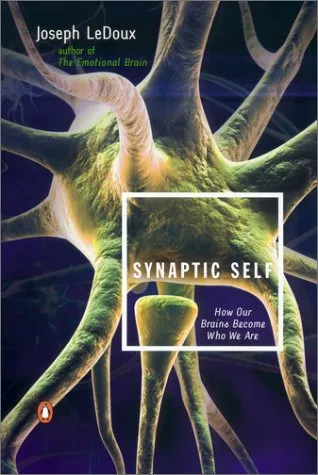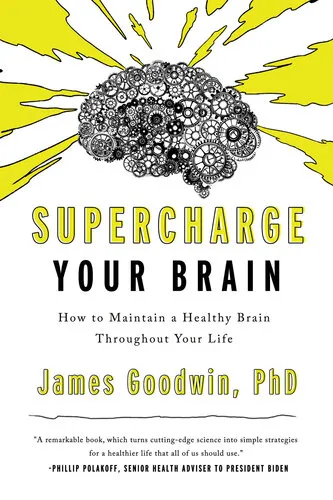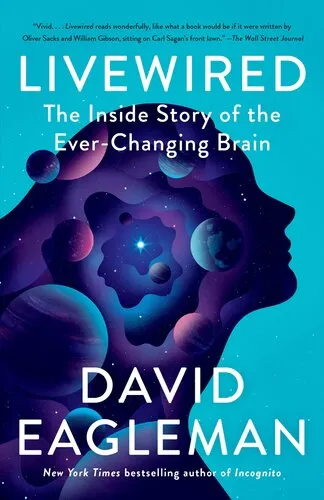Synaptic Self: How Our Brains Become Who We Are
4.5
بر اساس نظر کاربران

شما میتونید سوالاتتون در باره کتاب رو از هوش مصنوعیش بعد از ورود بپرسید
هر دانلود یا پرسش از هوش مصنوعی 2 امتیاز لازم دارد، برای بدست آوردن امتیاز رایگان، به صفحه ی راهنمای امتیازات سر بزنید و یک سری کار ارزشمند انجام بدینکتاب های مرتبط:
معرفی کتاب "Synaptic Self: How Our Brains Become Who We Are"
کتاب Synaptic Self اثر برجسته "جوزف لدو"، یکی از کتب مهم در زمینه علم اعصاب و شخصیت انسانی است که به بررسی رابطۀ میان فعالیتهای مغزی و هویت فردی میپردازد. این اثر با زبانی روشن و در دسترس، به خوانندگان کمک میکند تا درک بهتری از این مسئله پیچیده پیدا کنند که چگونه مغز ما، و به طور خاص سیناپسها (Synapses)، نقشی حیاتی در شکلگیری مفهوم "خود" ایفا میکنند.
خلاصهای جامع از کتاب
در کتاب Synaptic Self، "جوزف لدو" با استفاده از تحقیقات علمی پیشرفته، توضیح میدهد چگونه سیناپسها که نقطه اتصال بین نورونها هستند، نه تنها مسئول فرآیندهای اساسی مغز مانند حافظه و یادگیری هستند، بلکه به شکلگیری عمیقترین بخشهای هویت ما کمک میکنند. او بیان میکند که "خود" ما، به معنای احساس شخصیت و فردیت، محصول فعالیت اجتماعی نورونها در مغز است.
کتاب بر این ایده تمرکز دارد که هر چیزی در عقده روانی انسان، از احساسات گرفته تا دانش و خاطرات، نتیجه فعلوانفعالات در سطح سیناپسی است. دکتر لدو این حقیقت علمی را به زبان ساده توضیح داده و نشان میدهد چگونه ساختار و عملکرد مغز با تجربیات ما تعامل دارد تا هویت شخصیمان را شکل دهد.
نکات کلیدی کتاب
- سیناپسها واحدهای اصلی در مغز هستند که نه تنها اطلاعات را منتقل میکنند، بلکه رفتار و شخصیت ما را شکل میدهند.
- فرآیندهایی مانند حافظه، یادگیری، عشق، و احساسات نقش بسزایی در شکلگیری شناخت فردی دارند.
- هویت و "خود" نتیجه تعامل مستمر بین ژنتیک، زیستشناسی، و تجربیات زندگی است.
- کتاب نشان میدهد که مغز همواره انعطافپذیر است و تحت تأثیر محیط و تجربیات جدید قرار میگیرد.
جملات معروف از کتاب
"The self is not a fixed entity but something that emerges, evolves, and changes through our experiences."
"Synapses are the essence of who you are. Change the synapses, and you literally change yourself."
چرا این کتاب مهم است؟
کتاب Synaptic Self به دلایل متعددی اثری فوقالعاده و خواندنی است. این کتاب بهطور منحصربهفردی بینشی جامع و علمی درباره نحوه عملکرد مغز و ارتباط آن با احساس "خود" ارائه میدهد. این دیدگاه به ما کمک میکند تا بفهمیم چگونه تجربیات، احساسات، و محیطمان تأثیرات عمیقی بر شخصیت و زندگی ما دارند. همچنین، برای دانشجویان و پژوهشگران در زمینههای علم اعصاب، روانشناسی، و فلسفه، این کتاب یک مرجع بینظیر است.
در دنیای مدرن که سوالات فلسفی درباره هویت و خود همواره مطرح میشود، این کتاب پاسخهای مستندی بر پایه تحقیقات علمی ارائه کرده و میتواند درک ما از وجود خودمان را عمیقتر کند.
Introduction to Synaptic Self: How Our Brains Become Who We Are
Written by neuroscientist Joseph LeDoux, Synaptic Self delves deep into the relationship between the physical connections within our brain—our synapses—and the very essence of who we are. This groundbreaking book offers an accessible and thought-provoking exploration of how our brains, through dynamic interactions between billions of neurons, create our sense of self, personality, and identity. By combining neuroscience, psychology, and philosophy, LeDoux provides a compelling argument for why understanding the brain at a cellular level is key to answering the age-old question: "What makes us who we are?"
LeDoux explains that the formation of the "self" is not an abstract, spiritual phenomenon but rather a product of intricate brain processes involving synaptic connections. These tiny yet profound neural interactions hold the roadmap to understanding our emotions, behaviors, memories, and individuality. With engaging clarity, Synaptic Self is not just a book about neuroscience—it is a narrative about you, your brain, and the essence of what it means to be human.
Detailed Summary of the Book
LeDoux's key premise in Synaptic Self is that our identity is deeply tied to the brain's synaptic connections. These connections are responsible for forming the experiences and memories that shape our individuality.
The book begins by introducing the science of synapses, which are the communication points between neurons. From there, LeDoux discusses how synaptic plasticity—the brain's ability to change and adapt these connections over time—underlies learning, memory, and emotional responses. He demonstrates that the "self" is not a static entity but a constantly evolving mosaic of neural processes, molded by biology, experience, and environment.
LeDoux takes readers through various layers of the human experience, including emotion, fear, and consciousness, to show how these are rooted in brain activity. Each chapter builds on the idea that our mental states, from our happiest memories to our deepest fears, are encoded in networks of synapses. He draws on both neurological research and psychological studies to illustrate how trauma, attachment, and social interactions leave indelible marks on our brain and, consequently, our sense of identity.
Synaptic Self also challenges traditional views of the self, moving away from dualistic philosophies that separate mind and body. Instead, LeDoux positions the brain as the cornerstone of who we are, arguing that the self is biological, embodied, and emergent.
Key Takeaways
- The brain's synaptic connections form the foundation of our sense of self.
- Synaptic plasticity plays a crucial role in shaping personality, behaviors, and memories.
- The "self" is dynamic and constantly evolving, influenced by experiences, emotions, and social interactions.
- Understanding emotions like fear and happiness requires understanding their neurological basis.
- Our sense of identity is tightly linked to the biology of the brain, challenging dualistic perspectives that separate mind and body.
Famous Quotes from the Book
- "The self is not a thing but a process—a dynamic interaction of synaptic connections in the brain."
- "Your synapses define who you are. They store your memories, your skills, your traits, and your emotional responses."
- "If you want to understand the self, you have to understand the brain at its most fundamental level."
- "The synapse is where biology and experience collide, creating the mosaic of neural identities inside us."
Why This Book Matters
Synaptic Self is a vital contribution to our understanding of human behavior, identity, and consciousness. It bridges the gap between neuroscience and the humanities, offering a framework for exploring the complexities of the human mind. By grounding concepts of identity and the self in tangible biological processes, LeDoux demystifies the brain and makes it accessible to both scientists and lay readers alike.
Moreover, the book encourages readers to reflect on their own lives, offering insights into how memories, emotions, and relationships shape who they become. In doing so, it not only educates but also empowers individuals to better understand themselves and others. Whether you're a neuroscience enthusiast, a psychology student, or simply a curious reader, Synaptic Self provides invaluable tools for exploring what it means to be human.
دانلود رایگان مستقیم
شما میتونید سوالاتتون در باره کتاب رو از هوش مصنوعیش بعد از ورود بپرسید
دسترسی به کتابها از طریق پلتفرمهای قانونی و کتابخانههای عمومی نه تنها از حقوق نویسندگان و ناشران حمایت میکند، بلکه به پایداری فرهنگ کتابخوانی نیز کمک میرساند. پیش از دانلود، لحظهای به بررسی این گزینهها فکر کنید.
این کتاب رو در پلتفرم های دیگه ببینید
WorldCat به شما کمک میکنه تا کتاب ها رو در کتابخانه های سراسر دنیا پیدا کنید
امتیازها، نظرات تخصصی و صحبت ها درباره کتاب را در Goodreads ببینید
کتابهای کمیاب یا دست دوم را در AbeBooks پیدا کنید و بخرید
1638
بازدید4.5
امتیاز0
نظر98%
رضایتنظرات:
4.5
بر اساس 0 نظر کاربران
Questions & Answers
Ask questions about this book or help others by answering
No questions yet. Be the first to ask!











